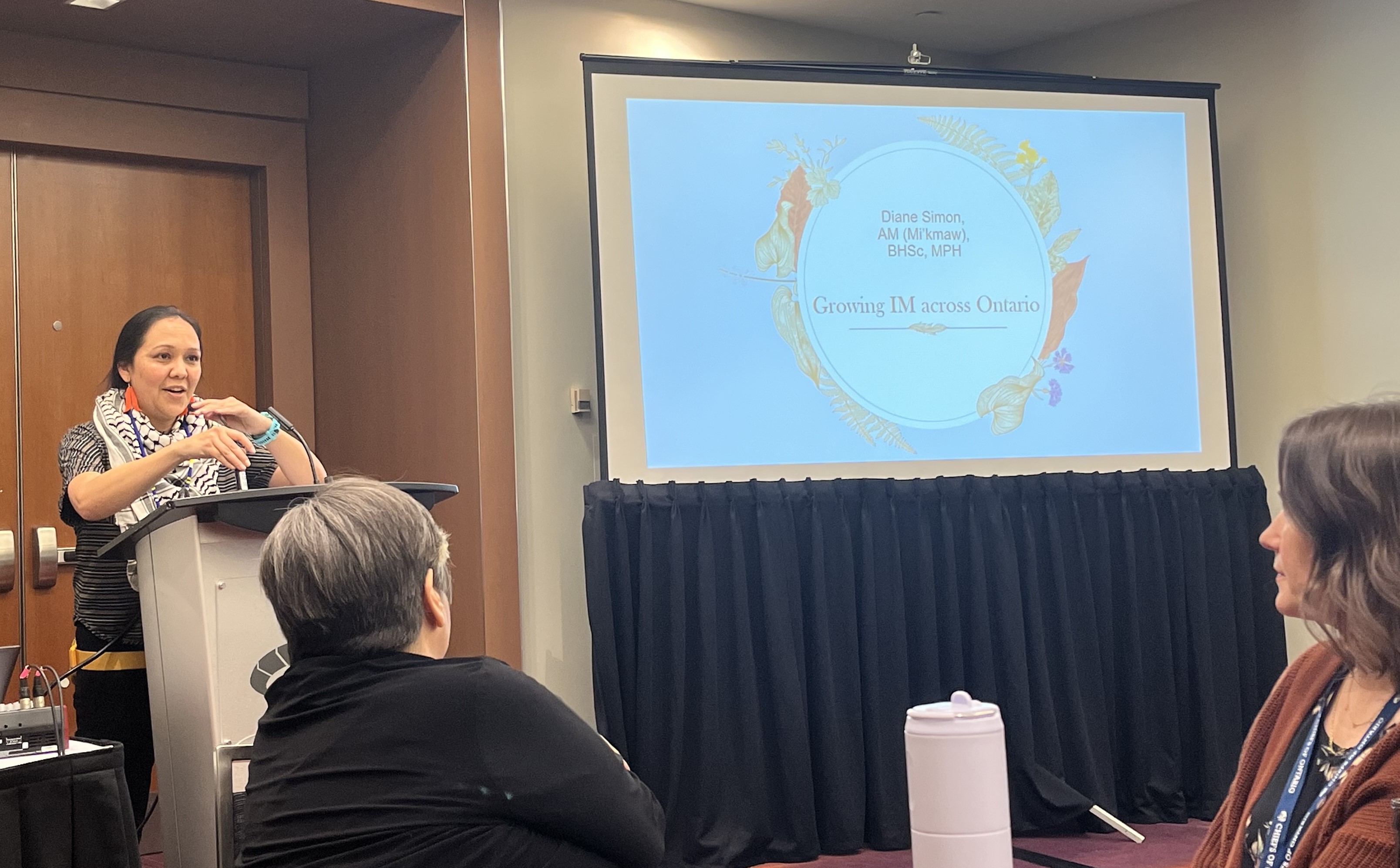AOM Indigenous Midwifery team attends inaugural First Nations Community Wellness Conference 2024

April 3, 2024
Photo: Diane Simon presenting at the FNCWC, March 2024.
The AOM Indigenous Midwifery (IM) delegation had the honour of attending the inaugural First Nations Community Wellness Conference (FNCWC) in Toronto from March 19-21, 2024. The event, organized by the Chiefs of Ontario, served as a forum for over 750 participants with the united goal of improving community wellness among Ontario First Nations. The conference was a collaboration across sectors, including Ontario First Nations Leadership, First Nations community workers and government representatives from across Ontario.
The AOM's IM team contributed to dialogue with a series of workshops illuminating the important role of midwifery in Indigenous communities. One of the presentations, Envisioning Midwifery for All First Nations Communities, led by Diane Simon, Mik’maw midwife and IM Policy Analyst at the AOM, delved into the economic and sociocultural benefits of midwifery. Simon underscored the necessity of community-based education and the pathways to establishing midwifery practices that resonate with the needs and capacities of First Nations communities. “There are so few communities that have community-based midwifery. We have to start getting that information out there to let people know there is an alternative, and they just don't have access to it. We need to start working together to build access and opportunities,” Simon offers.
The workshop Forging a Pathway for Indigenous Midwives: Collaborative Efforts for Hospital Integration was co-facilitated by Ellen Blais, Executive Director of National Council of Indigenous Midwives (NCIM), and staff from London Health Sciences Centres (LHSC), including Chantel Antone, Senior Director, Office of Inclusion and Social Accountability (Indigenous Health); Lauren Columbus, RM, Academic Practice Lead, Department of Midwifery; and Melodie Smith, Indigenous Midwife. The presentation focused on groundbreaking work led by LHSC addressing significant barriers Indigenous midwives face in obtaining hospital privileges with a goal to provide a privileging pathway for Indigenous midwives working within the Exemption Clause. The session shed light on the challenges of conservative credentialing processes and the need for culturally responsive and strengths-based care pathways. Overcoming these barriers requires accountability from public institutions, especially adherence to the Truth and Reconciliation Commission's Calls to Action 18 - 24 (PDF, 298 KB), dedicated to fostering a health-care system that fully supports Indigenous care providers.
There are so few communities that have community-based midwifery. We have to start getting that information out there to let people know there is an alternative, and they just don't have access to it. We need to start working together to build access and opportunities.
- Diane Simon
Carol Couchie, Indigenous Midwife and AOM Policy Analyst, led the (Re)Visioning Holistic Indigenous Midwifery Education in Community and on the Land workshop. This session offered an in-depth look at the National Council of Indigenous Midwives' (NCIM) Indigenous Midwifery Education (IME) Framework. Piloted in six Indigenous communities across Canada, including two in Ontario, the IME Framework responds to the barriers to the growth of health human resources in Indigenous midwifery.
Couchie shared insights from the 2023 evaluation of the pilot program, which sought feedback from First Nations Leadership and community workers. The IME Framework, characterized by its flexibility, remote access, self-paced learning and community sponsorship, provides a contrast to the westernized "sink or swim" model of education. Instead of promoting an individualized and competitive learning environment, it encourages communities to support their learners, allowing them the freedom to pursue educational goals and professional directions that align with their community's vision for revitalized birth. The evaluation highlighted the framework's challenges, successes and positive impacts, alongside recommendations for future expansion.
The First Nations Community Wellness Conference forum for unity, learning and shared purpose emphasized the need for a holistic approach to address the challenges faced by Indigenous communities. The many engaging discussions, innovative education strategies and dedication to advocacy characterized the spirit of collaboration throughout the event and reflects the shared commitment to enhancing community wellness among Ontario First Nations through comprehensive, culturally informed health practices.
